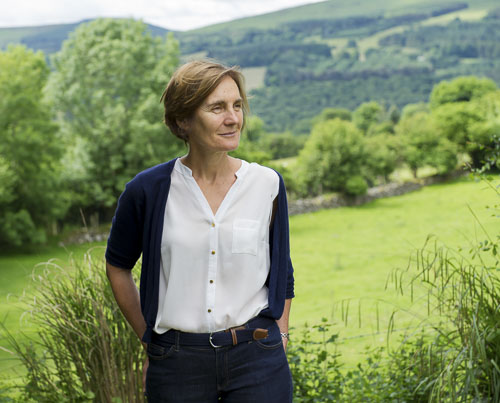
Promise
After the talk with the palliative nurse
over cups of tea in the kitchen, my mother
tells me she’s already asked my father
to promise he’ll make it through the winter –
it’ll be sixty years in April, Charlie.
Sixty years since she walked down the aisle
in her dress of pristine lace, beaded bodice
and tiny satin-covered buttons at the nape,
a full skirt of tulle falling from her waist
to red and black tiles. Ballymoe Church
is tumbling now, stone by stone,
beneath the weight of brambles, ivy, ash.
I was eager and silly as a suck calf, she laughs,
as she readies his tablets, a whiff of silage
rising from the coats drying by the stove.
When he falls asleep
at the kitchen table and drops
another cup, my mother bends
without a word, sweeps up
the broken pieces in her hands,
looking out for shards in case
he wanders bare foot in the night.
Planting Trees
Dad taught us that paper
comes from trees and the word for book
comes from beech. He showed us
the olive-grey bark, smooth as river rocks,
how to tell the light hues of young wood
from the gloom of the old
and how to count the rings – starting
at the centre, working out towards the edge.
He’s unable to move from his bed,
but when we ask about the row of beech
beside the bridge, he’s clear as a bell,
my father’s father’s father planted them,
a shelter-belt for a nursery, when the British
were giving grants for planting trees.
Tomorrow, I’ll get dressed,
we’ll go down to see them again.
I’ve got you
Through days of morphine,
tidbits to tempt his appetite,
there’s nowhere else to be,
I hold his teacup to his lips,
wash his face and the hands
I rarely touched.
During the night old hurts
and worries surface
like stones in a well-tilled field.
What time is it now? he asks
on the hour. He sings to himself
and murmurs lines he learned
as a child, ‘All we, like sheep
have gone astray, we have turned
everyone to his own way’.
When he asks to get up,
I hold his wrists,
brace my weight against his.
For a moment he’s confused –
it’s ok Janey, I’ve got you,
go on now, you can stand.
Respects
From Roosky, Creemully, Louglyn,
Kiltoom, Kilbegnet, Moyliss,
Brideswell, Lecarrow, Creggs,
Athleague, Ballinleg, Carrowkeel,
they came to pay their respects.
They shook hands with us,
stood by his body and bowed
their heads. Cattle men,
sheep men, carpenters, teachers,
foresters, nurses,
mart managers, vets;
they said prayers, laid their hands
on his chest and blessed
themselves, then filled the kitchen
with the man they knew,
a grand man altogether,
always out early, a hardy hoor,
a good judge of a bullock,
fierce man to work, a man of his word,
he had woeful hands.
I slipped out for a while to see
the flawless orange globe
hung low over the Common
and a flock of whooper swans
feasting on the last of the winter grass.
Dunamon
i.m. Charlie Clarke
They dig slower as they go deeper,
taking turns to heave shovels of clay,
throwing bigger stones and rocks
up into the tractor box.
Son, grandson, nephew, neighbours,
they’ve already gone down five feet,
when they lay their tools aside,
drink tea, light up for a smoke
and agree they couldn’t have
a better day for digging a grave –
not a cloud to be seen,
sunshine melting last night’s frost,
and, from the woods behind them,
a chaffinch singing his heart out.
—Jane Clarke
x
Jane Clarke’s first collection, The River, was published by Bloodaxe Books in 2015. Originally from a farm in Roscommon, Jane now lives near Glenmalure, County Wicklow. In 2016 she won the inaugural Listowel Writers’ Week Poem of the Year Award and the Hennessy Literary Award for Poetry. She was shortlisted for the Royal Society of Literature 2016 Ondaatje Literary Award. www.janeclarkepoetry.ie
x
x
wonderfully moving poems, Jane. They speak to so many people who have experienced the death of a father. I lost mine when I was 22.
Oh Jane. Such moving poetry. I often wish i had dug my wife’s grave.
So touching …